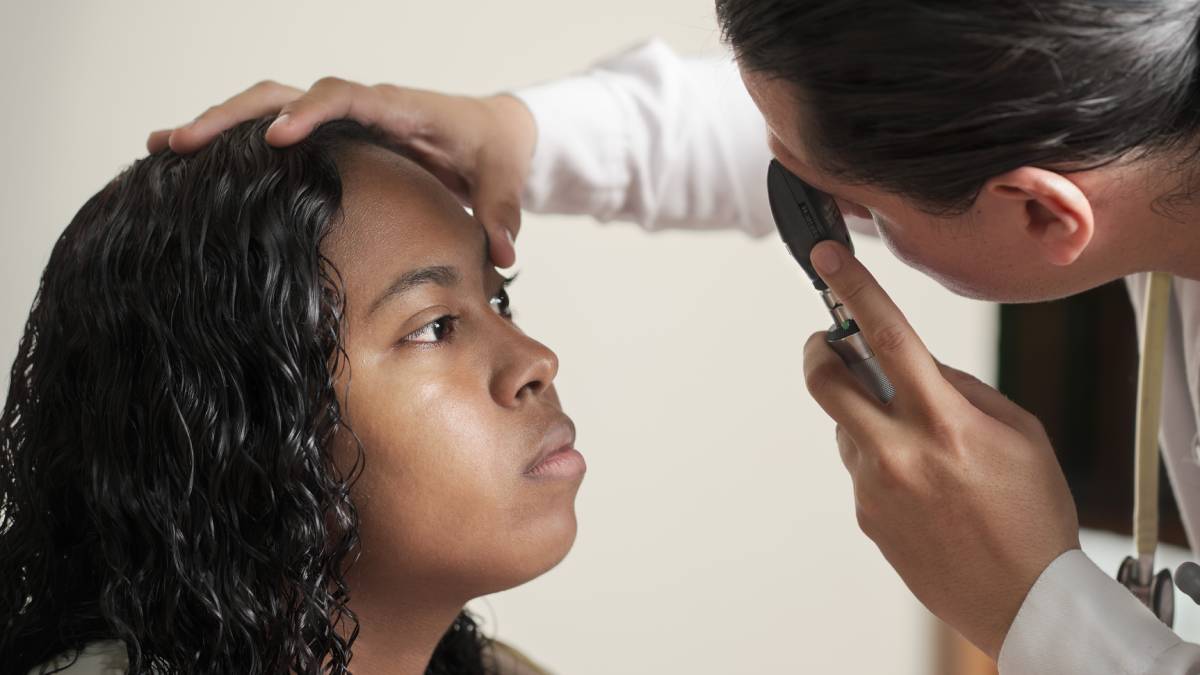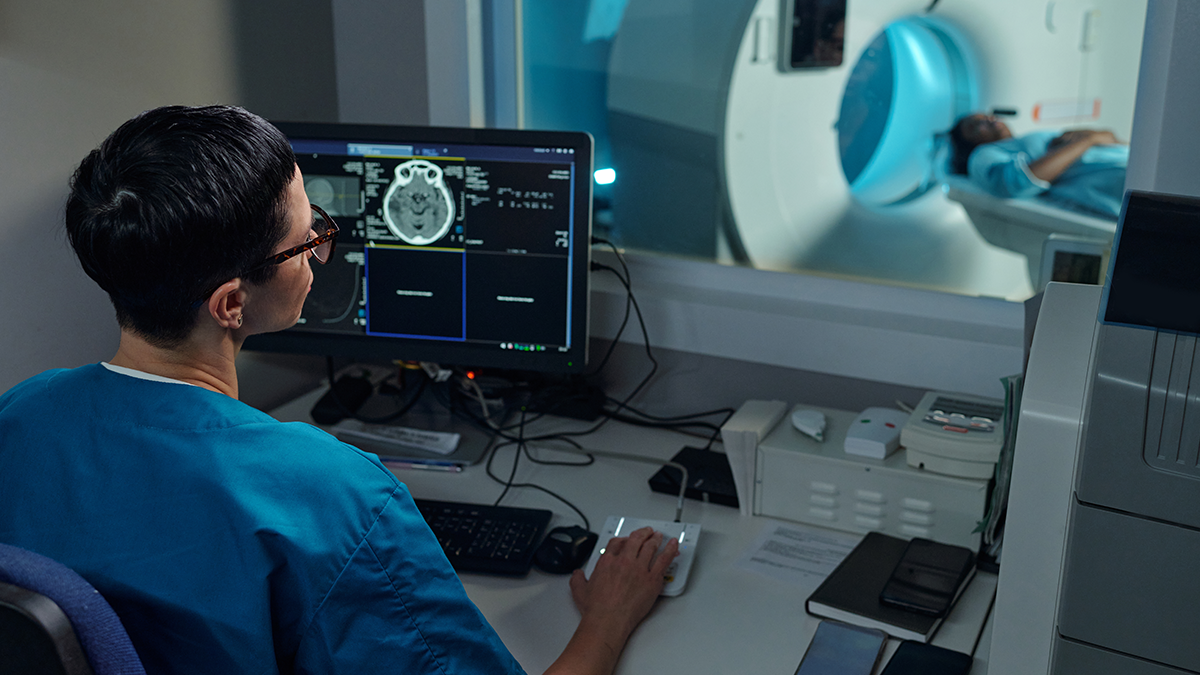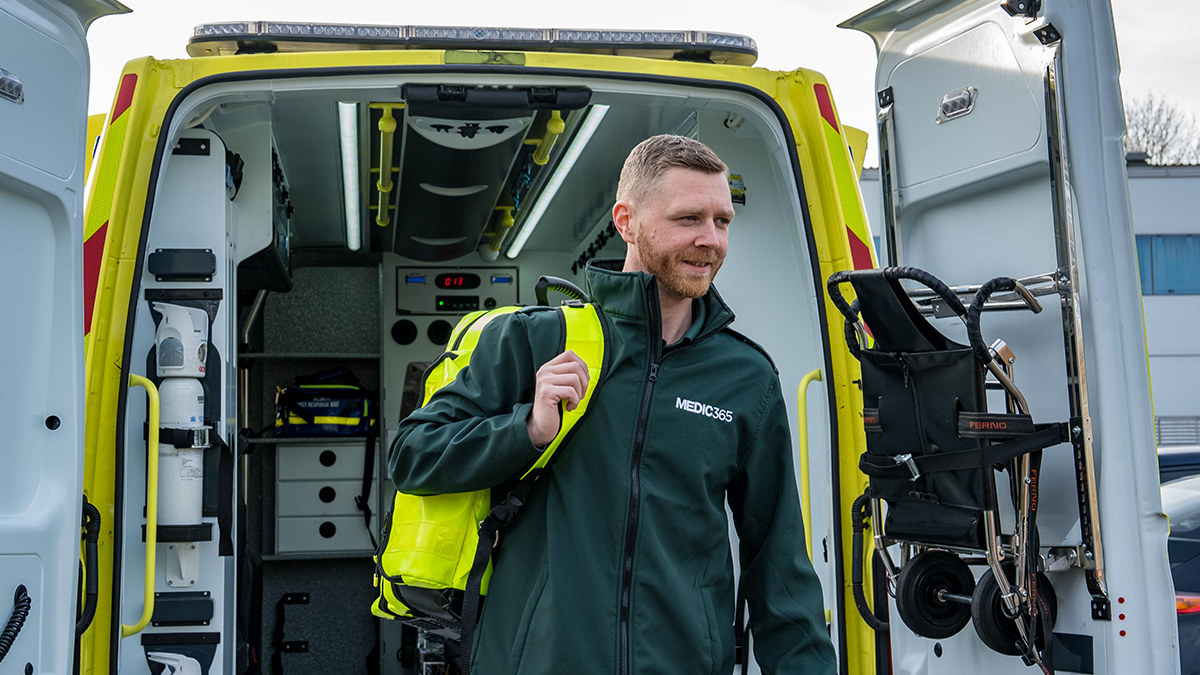Imagine witnessing someone take a hard knock to the head during a sports match, at work, or even from a simple fall at home. They seem dazed, confused, or complain of a headache. But how can you tell whether they’re seriously injured and have a concussion? Understanding these symptoms and how to respond appropriately could make all the difference in getting someone the help they need.
Head injuries can be frightening, but with the right knowledge, you can feel more confident about recognising the signs and taking the proper steps to help. The experienced team at Medic 365 works with paramedics and emergency medical professionals every day, and we understand just how important it is to recognise serious head injuries quickly and respond appropriately.
This comprehensive guide will help you understand everything you need to know about head injuries, from answering the question “what is a concussion?” to recovery and prevention. By the end of this article, you’ll have the knowledge and confidence to recognise potential concussions and know exactly what steps to take.
What Is A Concussion? Everything You Need to Know
Feeling uncertain about head injuries? That’s completely understandable. Concussions can be complex, but with clear, expert guidance, anyone can learn to recognise the signs and respond appropriately. Here’s what this guide covers:
- What Is Concussion?
- What Are Concussion Symptoms?
- How Long After Hitting Your Head Can Concussion Symptoms Start?
- How To Check For Concussion
- What Causes A Concussion?
- How To Treat Concussion
- How Long Does A Concussion Last?
- Can You Sleep With A Concussion?
- Can You Fly With A Concussion?
- When Should You Seek Emergency Medical Help?
- Long-term Effects Of Concussions
- Concussion FAQs

What Is Concussion?
Concussion is a type of head injury that causes the brain to shake back and forth inside the skull, causing mild damage, according to Headway, the UK’s leading brain injury charity. Think of your brain as sitting in a protective cushion of fluid inside your skull. When you experience a sudden impact, your brain can bounce or twist inside the skull, temporarily affecting how it works. Concussions are often called “invisible injuries” because you can’t see the damage from the outside, and symptoms might not appear immediately.
Why Are Concussions Serious?
Although most people recover fully from concussions, it’s important to treat them seriously, according to the NHS. The brain requires time to recover, and it is more susceptible to harm during this time. This is the reason that appropriate management, evaluation, and recognition are crucial.
The key thing to understand is that concussions affect how your brain functions, not its structure. This temporary disruption can impact memory, concentration, balance, and coordination until the brain has time to recover properly.
To better understand what happens during a concussion, you might find this video explanation helpful:
What Are Concussion Symptoms?
Recognising concussion symptoms is crucial because the person affected might not realise they’ve been injured. Symptoms can appear immediately after the injury or may develop over hours or even days, which is why understanding what to look for is so important.
Immediate Physical Symptoms:
- Headache: Often described as pressure or aching
- Dizziness or feeling “off-balance”
- Nausea or vomiting
- Sensitivity to light or noise
- Blurred or double vision
- Feeling sluggish or foggy
Cognitive And Emotional Symptoms:
- Confusion or feeling dazed
- Memory problems: Especially remembering events before or after the injury
- Difficulty concentrating
- Feeling more emotional than usual
- Irritability or mood changes
- Anxiety or nervousness
Sleep-Related Symptoms:
- Sleeping more than usual
- Difficulty falling asleep
- Feeling drowsy during the day
Observable Signs Others Might Notice:
- Brief loss of consciousness (though this doesn’t always happen)
- Appearing dazed or stunned
- Moving clumsily or a lack of coordination
- Slow response to questions
- Repeating questions or seeming confused
- Personality changes
It’s important to note that you don’t need to lose consciousness to have a concussion. In fact, according to Headway, the brain injury charity, loss of consciousness occurs in less than 10% of concussions.

How Long After Hitting Your Head Can Concussion Symptoms Start?
The fact that concussion symptoms don’t always show up right away is among the most crucial things to realise. Continuous monitoring is essential because some symptoms may appear gradually over the course of hours or even days following the initial damage.
Immediate Onset (Within Minutes):
Many concussion symptoms appear right away, including headache, dizziness, confusion, and nausea. However, even if someone seems fine initially, this doesn’t rule out a concussion.
Delayed Onset (Hours to Days Later):
Some symptoms may take time to develop, particularly:
- Sleep disturbances
- Concentration problems
- Memory difficulties
- Mood changes
- Persistent headaches
Why The Delay Happens:
The brain’s response to injury can be gradual. Initial swelling, chemical changes in the brain, and the body’s inflammatory response can all contribute to symptoms appearing later. This is why medical professionals often recommend monitoring for 24-48 hours after a head injury.
This delayed symptom onset is one of the reasons why proper first aid training is so valuable. Our first aid course in Milton Keynes covers head injury recognition and response, helping you understand when to seek immediate help versus when to monitor carefully for developing symptoms.

How To Check For Concussion
Knowing how to check for a concussion can help you make informed decisions about when to seek medical help. While only medical professionals can officially diagnose a concussion, there are important signs you can look for.
Simple Assessment Steps:
Check Responsiveness:
- Are they alert and able to answer simple questions?
- Do they know their name, where they are, and what day it is?
- Can they remember what happened?
Observe Their Behaviour:
- Are they moving normally?
- Do they seem confused or dazed?
- Are they repeating questions or statements?
- Have their personality or mood changed?
Look For Physical Signs:
- Visible head injury or bump
- Unequal pupil sizes
- Balance problems when standing or walking
- Nausea or vomiting
Ask About Symptoms:
- Headache
- Dizziness
- Feeling “foggy” or confused
- Sensitivity to light or noise
- Any vision problems
What NOT To Do When Checking:
- Don’t move someone if you suspect a spinal injury
- Avoid giving medication without medical advice
- Don’t assume they’re fine if they seem normal initially
- Never let someone with a suspected concussion drive
The British Red Cross provides excellent guidance on assessing head injuries, emphasising the importance of professional medical evaluation for any suspected concussion.

What Causes A Concussion?
Understanding what causes concussions can help you recognise when someone might be at risk and take appropriate precautions. Concussions can happen in many different ways, and they’re more common than you might think.
Common Causes Include:
Sports Injuries: Contact sports like rugby, football, and boxing carry higher risks, but concussions can occur in any sport where falls or collisions are possible, including cycling, horse riding, or even football (soccer).
Vehicle Accidents: Car, motorcycle, or bicycle accidents can cause the head to jolt suddenly, leading to a concussion even without direct impact to the head.
Falls: Slips and falls are particularly common causes, especially among older adults and young children. This could be falling down stairs, slipping on wet surfaces, or falling from a height.
Workplace Accidents: Construction sites, warehouses, and other industrial environments can present risks from falling objects or workplace accidents.
Assault or Violence: Unfortunately, intentional harm can also cause concussions through blows to the head or violent shaking.
Everyday Accidents: Simple incidents like walking into a low-hanging branch, bumping your head on a cupboard, or even vigorous shaking can sometimes result in a concussion.
Who Is Most At Risk?
While anyone can experience a concussion, certain groups are at higher risk:
- Athletes participating in contact sports
- Young children and teenagers
- Adults over 65
- People who have had previous concussions
- Those in high-risk occupations
Understanding these risk factors is part of comprehensive safety training. Our first aid at work courses in Milton Keynes include workplace-specific guidance on preventing and responding to head injuries in various work environments.

How To Treat Concussion
Knowing how to treat a concussion properly is essential for anyone who might encounter a head injury situation. While professional medical assessment is crucial, immediate first aid response can make a significant difference.
Immediate First Aid Steps:
Ensure Safety: Make sure the person is in a safe location away from further harm.
Call for Help: Contact emergency services (999) if the person loses consciousness, is vomiting repeatedly, or is showing signs of serious injury.
Keep Them Awake: Try to keep the person conscious and talking, especially in the first few hours.
Monitor Symptoms: Watch carefully for changes in their condition.
Don’t Leave Them Alone: Stay with them, especially during the first 24 hours.
Medical Treatment:
A professional would usually suggest managing pain with paracetamol (while avoiding other medications unless advised by a doctor), getting plenty of physical and mental rest to support healing, and then gradually returning to normal activities as symptoms improve.
What NOT To Do:
- Don’t give aspirin or ibuprofen initially
- Avoid alcohol or recreational drugs
- Don’t drive or operate machinery
- Avoid strenuous physical or mental activities
- Don’t assume they’ll be fine without a medical assessment
The British Red Cross recommends applying something cold to reduce swelling and pain, such as frozen vegetables wrapped in a towel, but never place ice directly on the skin.

How Long Does A Concussion Last?
One of the most common questions people have is: How long does a concussion last? Recovery time varies significantly from person to person, but understanding the typical recovery process can help set realistic expectations and ensure proper care.
Typical Recovery Timeline:
First 24-48 Hours: This is the most critical period. Symptoms are often at their worst, and close monitoring is essential.
First Week: Many people begin to feel better, though some symptoms may persist. Rest is crucial during this period.
2-4 Weeks: Most adults recover within this timeframe, though some may need longer.
Children and Teenagers: Often require longer recovery periods and should be closely monitored by healthcare professionals.
Factors Affecting Recovery Time:
- Age: Younger brains typically need more time to heal
- Previous Concussions: Can prolong recovery time
- Severity of Initial Injury: More severe impacts may require longer healing
- Individual Health: Overall health and fitness levels
- Proper Rest and Care: Following medical advice significantly impacts recovery
Post-Concussion Syndrome:
Some people experience symptoms that persist for weeks or months after the initial injury, known as post-concussion syndrome. According to NHS Inform, this can include persistent headaches, memory problems, and difficulty concentrating.

Can You Sleep With A Concussion?
This is one of the most frequently asked questions about concussion care, and the answer has evolved with medical understanding. Can you sleep with a concussion? The current medical guidance suggests that sleep is actually beneficial for recovery, but with important precautions.
Current Medical Guidance:
Rest, including sleep, is essential for brain recovery. The old advice to keep someone awake all night has been updated. Safe sleep guidance includes:
- Someone should check on the person every 2-3 hours initially
- They should be easily awakened for these checks
- If they become difficult to wake or their condition changes, seek immediate medical help
When To Avoid Sleep:
- If medical professionals advise against it
- In the immediate hours after a severe impact
- If the person is showing serious warning signs
- Until they’ve been assessed by a healthcare professional
Important Notes:
Always follow specific medical advice for individual cases. If you’re unsure, contact NHS 111 or your GP for guidance. Sleep patterns may be disrupted during concussion recovery, which is normal but should be monitored.

Can You Fly With A Concussion?
Another common question, especially for those who travel frequently or have had accidents while away from home, is: Can you fly with a concussion? The answer depends on several factors and should always involve medical consultation.
Medical Considerations:
Timing: Most medical professionals recommend waiting at least 24-48 hours after a concussion before flying, but this can vary based on severity.
Symptom Severity: Flying may worsen symptoms like headaches, dizziness, and nausea due to cabin pressure changes.
Medical Clearance: Always seek medical advice before flying after a head injury.
Potential Risks Of Flying With Concussion:
- Worsening of headaches and nausea
- Increased discomfort from cabin pressure changes
- Difficulty getting medical help if symptoms worsen
- Problems with travel insurance if flying against medical advice
Safe Flying Guidelines:
- Get medical clearance first
- Travel with someone who can help if needed
- Carry medical documentation
- Consider postponing non-essential travel
- Inform the airline crew of your condition

When Should You Seek Emergency Medical Help?
Knowing when to seek emergency medical help can be life-saving. While many concussions can be managed with rest and monitoring, certain warning signs require immediate professional attention.
Call 999 Immediately For:
- Loss of consciousness lasting more than a few seconds
- Repeated vomiting
- Severe, worsening headache
- Seizures or convulsions
- Extreme drowsiness or difficulty staying awake
- Confusion that’s getting worse
- Weakness or numbness in arms or legs
- Slurred speech
- Significant behaviour changes
- Clear fluid draining from the nose or ears
Seek Medical Advice Within 24 Hours If:
- Any loss of consciousness occurred
- Moderate to severe headache persists
- Persistent nausea or vomiting
- Memory problems around the time of injury
- Feeling confused or “not right”
- Balance problems or dizziness
According to Cambridge University Hospitals NHS Foundation Trust, for most people, a concussion is a minor event that has no lasting side effects. However, in some cases, the effects can last several weeks or longer.
Remember, it’s always better to seek medical advice when in doubt. Healthcare professionals can provide proper assessment and guidance for safe recovery.

Long-term Effects Of Concussions
Understanding the potential long-term effects of concussions helps ensure proper care and monitoring. While most people recover completely, being aware of possible complications is important for anyone who has experienced a head injury.
Most Common Long-term Effects:
Post-Concussion Syndrome: Some people experience symptoms that persist for weeks or months after the initial injury. These may include ongoing headaches, memory and concentration problems, sleep disturbances, and mood changes.
Increased Sensitivity: Some people remain more sensitive to light, noise, or busy environments for extended periods.
Cognitive Changes: Temporary difficulties with memory, concentration, or processing information.
Multiple Concussions:
Research suggests that people who have had multiple concussions may be at increased risk for long-term cognitive problems. This is why proper recovery and medical clearance before returning to activities is so important.
Second Impact Syndrome:
This rare but serious condition can occur if someone sustains a second head injury before fully recovering from the first. It emphasises the importance of complete recovery before returning to normal activities.
Positive Recovery Outlook:
The vast majority of people recover completely from concussions without long-term effects. Proper rest, medical guidance, and gradual return to activities significantly improve outcomes.

Concussion FAQs
Understanding concussions can feel overwhelming, but these frequently asked questions address the most common concerns people have about head injuries and recovery.
Do You Always Lose Consciousness With A Concussion?
No, loss of consciousness occurs in fewer than 10% of concussions. You can have a significant concussion without ever losing consciousness. The severity of a concussion isn’t determined by whether someone was knocked out.
What’s The Difference Between A Concussion And Other Head Injuries?
A concussion is a mild traumatic brain injury that temporarily affects brain function. More severe brain injuries might involve bleeding, swelling, or permanent damage. Concussions typically don’t show up on standard brain scans, while more serious injuries usually do.
How Long Should You Stay Off Work Or School?
This depends on the individual and their symptoms. Some people may need just a few days, while others might require several weeks. The key is a gradual return to activities as symptoms improve, always under medical guidance.
Can Children Get Concussions?
Yes, children can and do get concussions. In fact, their developing brains may be more vulnerable to injury and typically require longer recovery periods. Any suspected concussion in a child should be evaluated by a healthcare professional.
Are Some People More Likely To Get Concussions?
Yes, certain factors can increase risk, including participation in contact sports, previous head injuries, age (very young and older adults), and certain occupations. However, concussions can happen to anyone.
Can You Prevent All Concussions?
While you can’t prevent all concussions, many can be avoided through proper safety measures like wearing protective equipment in sports, using seatbelts, making homes safer to prevent falls, and following workplace safety guidelines.
What Should You Do If Someone Refuses Medical Help After A Head Injury?
This can be challenging, especially if the person seems confused or their judgment is impaired by the injury. Try to explain the importance of medical assessment, involve family members or friends who can help persuade them, and don’t hesitate to call emergency services if you’re seriously concerned about their safety.
How Do You Know When Someone Has Fully Recovered?
Full recovery means all symptoms have resolved and the person feels completely back to their normal baseline. Medical clearance is often needed before returning to high-risk activities like contact sports. Recovery should be gradual, and symptoms shouldn’t return with increased activity.

Your Next Steps: Get Professional Training With Medic 365
Understanding concussions is just one part of being prepared for medical emergencies. Whether you’re a parent wanting to protect your children, an employer responsible for workplace safety, or simply someone who wants to be ready to help in an emergency, proper first aid training makes all the difference.
At Medic 365, our comprehensive first aid courses cover head injuries, emergency response, and much more. Our first aid course in Milton Keynes provides hands-on training in recognising and responding to concussions and other head injuries. We also offer specialised first aid at work courses in Milton Keynes that include workplace-specific guidance on preventing and managing head injuries in various work environments.
With decades of experience in emergency medical services, our team of qualified paramedics and medical professionals provides training that’s both practical and confidence-building. Our courses are designed to be accessible and engaging, giving you the skills and knowledge to respond effectively in real emergencies.
From recognising concussion symptoms to providing life-saving first aid, we’ll help you feel prepared and confident. Our flexible training options can accommodate busy schedules, and we can even conduct courses at your workplace for maximum convenience.
Don’t wait until an emergency happens to wish you knew what to do. Take the first step today and get in touch to learn more about our first aid training courses. Because when seconds count, proper training can make all the difference.

